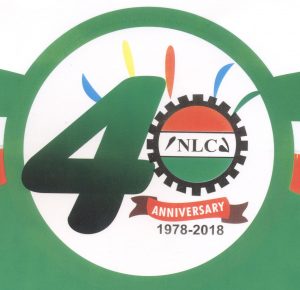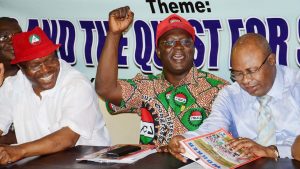The labour roots of the editorial minders of the Abuja based The Worker positions the periodical in terms of the best possible coverage of the recent 40th anniversary of Nigeria’s central labour platform – the Nigeria Labour Congress, (NLC). Did it disappoint? No. It did not. Its coverage is the most elaborate. The finishing is also superb. But what message did the bumper edition send to the average reader?
The answer to this question can hardly be a consensus. The only possibility is how most of those who were witnesses to history as the NLC reified itself from its birth to date cannot escape a sense of ovation, nostalgia and revivalism in reading the magazine. A history of the magnitude of accomplishment of the NLC is a history of ovation. The memories each event that marked the anniversary packed speaks to nostalgia or concern with replicability. The politics of memory is the politics of revivalism. Remembering the past 40 years is a way of turning on itself to see what was most crucial and, by implication, worth doing all over again.
Ovation
 One thing the magazine’s coverage has done is reminding the average reader how the NLC has never been just a labour platform. The NLC emerged the most important player in the struggle for a more profound version of democracy in Nigeria the moment it bought into a broader conception of the working class in ‘Third World’ societies that stretches beyond non-existent factory workers to the urban poor, women and transitional elements such as students. It rose to the challenge with informed, morally sound and patriotic leaders. With its ability to enter into striking alliances with such groups thereby bringing within its fold intellectuals, students, women groups and middle class professionals, it could educate, mobilise and hold its ground against military dictatorship.
One thing the magazine’s coverage has done is reminding the average reader how the NLC has never been just a labour platform. The NLC emerged the most important player in the struggle for a more profound version of democracy in Nigeria the moment it bought into a broader conception of the working class in ‘Third World’ societies that stretches beyond non-existent factory workers to the urban poor, women and transitional elements such as students. It rose to the challenge with informed, morally sound and patriotic leaders. With its ability to enter into striking alliances with such groups thereby bringing within its fold intellectuals, students, women groups and middle class professionals, it could educate, mobilise and hold its ground against military dictatorship.
That is why it had such a formidable list of heroes to celebrate or admit into its ‘Hall of Fame’. Quite a large list, each of whom spoke to one distinctive attribute or another. It is unarguable if this is not true of Hassan Summonu, Dr. Kolagbodi, Paschal Bafyau, Ali Chiroma, Lasisi Osunde, SOZ Ejiofoh, Alao Aka-Bashorun, Eskor Toyo, Bala Usman, Mahmud Moddibbo Tukur, Bade Onimode, Festus Iyayi, Abubakar Momoh, Bamidele Aturu, Olaitan Oyerinde, Chima Ubani and Funmi Komolafe. Some others could have made this list if they were not still active in the public sphere.
Outside of the human agency, 1986 remains the height of NLC’s all time core competence when it comes to ovation. That was when it took on the Babangida regime head on over police and university administration’s high handedness in managing a student revolt at the Ahmadu Bello University, Zaria. Its ability to successfully politicise the killings by linking it to contradictions of authoritarianism and the attendant repression must have hit the military regime so hard as for it to mass its own intellectuals on regime legitimation and survival. But even then, the government of the day had to resort to what a leading radical activist called ‘armed populism’. In other words, the Babangida mystique as a practitioner of human rights and an opposition tolerant dictatorship had to give way to deployment of armoured tanks to crushing Nigeria’s June 4th. That was in 1986.
Nostalgia
The title, (NLC @ 40), the celebratory narratives of the solidarity messages and the comprehensiveness of the list of those inducted into the ‘Hall of Fame’ all point to the nostalgia about it. That is nostalgia about the legacy of the NLC as a David who trounced over Goliath in many battles for survival. This legacy preceded duel with the military. In fact, the NLC never fought without a programme, sowing the seed of its emergence in the operationalisation of one such programmes – the sense of how formidable a labour centre they could transform into should the four labour centres that negotiated workers’ interest before the Adebo and later Udoji Commissions on Salaries and Wages in the early 1970s. Under the Shagari civilian administration in 1980, they had ‘Nigeria Not for Sale’ which opposed privatisation. When the military pushed Shagari aside and Buhari took over in 1983, they had their document “Towards Economic Recovery in Nigeria”. This was also the case in all the major debates under the General Babangida dictatorship from 1985 to 1993. In fact, at a point, the government had to create a parallel price structure for petrol in Nigeria because the analytical and logical force of the position of the NLC was too compelling. Till date, no other fighting groups have surpassed the message as well as the diction of the handbills with which it waged the 1986 ‘war’ against SAP.
Then things began to happen in favour of a downward spiral. Again, it would be difficult to find the answer to that in one single causal factor. The breaking of the alliance between the NLC by the military regime and the denial of the services of crack academics available to it in the NLC-ASUU Alliance could be one reason. ASUU refers to Academic Staff Union of Universities. Others would cite the convulsions that were taking place within the NLC itself. Some people also point to internal squabbles that were bound to produce steady decline in comparative terms. Change in ideological direction is not left out! In fact, at a point, some people started calling the NLC the same derisive name of ‘New Labour’ they were calling the British Labour Party because of the British Labour Party’s post Cold War ideological blending. In the Nigerian context though, there was no such tendency blending. The NLC remained officially committed to anti-neocolonialism or anti-neoliberal globalisation or whatever one chooses to call the post Cold War world order.
Revivalism

All set for revivalism? Comrade Peter Adeyemi, NLC Deputy President on the right,with Comrade Ayuba Wabba, NLC president in the middle and one other union leader
The past can be such an intrusive force on the present and the planning of the future. Yes, there are those who would say that the struggle does not have a format to which every other outing must correspond and that absolutising 1986 is unhelpful because the issues are not the same. Such people can argue that the NLC has gone through hell in the hands of successive military regimes and even non-military regimes in contemporary Nigeria; that neoliberalism, (Structural Adjustment Programme – SAP) has pulled the carpet from under the NLC’s feet in the way it has reshaped popular consciousness in different directions from the popular democratic aspirations NLC could easily trigger because people have simply become so inward, insular and attuned to localism than ever was the case; that the establishment has used fascist methods on the populace as to make popular struggle quite difficult if not impossible: how do people struggle when public service workers in more than 20 out of Nigeria’s 36 states are being owed salaries for as long as a year in some cases?
None of these would excuse the NLC not leading the movement for a more profound definition and practice of democracy in Nigeria in the present national and global context. But how might it do that? Professors Toye Olorode and Attahiru Jega have made some valid points on that in their presentations during ‘NLC @ 40’. But for a radical movement that predicted virtually all the misery, fragmentation and commotion going on today in Nigeria as early as the late 1980s, it would seem that a second version of ‘NLC @ 40’ is still an imperative. If the first ‘NLC @ 40’ allowed philosophers to interpret the past 40 years, the second version of ‘NLC @ 40’ should enable both the philosophers and the NLC to plan the next 40 years by interesting itself in two main questions. The first is, what would have happened if the radicals were the ones on top of the democratic order in Nigeria today? Would they have been shooting themselves as happened in some other places or would have been so mature in consolidating power? Put differently, would they have remained faithful to what they declared to drive them or acquired individual and collective autonomies thereby creating room for the ‘revolution’ to consume its own? This question came up repeatedly in the critique of Professor Attahiru Jega’s presentation. The second is why is it so impossible to do those things that radical nationalists – students, women groups, middle class professional elements united formally or informally under labour could do in the 1980s? Are there other explanations for that beyond some of the reasons mentioned in this feature already?
Finally, is revivalism a possibility without the NLC revising its ‘Marxism’ to reflect the complexity, pluralism and ambiguity that define contemporary social order in its campaigns? The argument here is that, even in pre-industrial societies such as Nigeria, the ‘working class’ has been shattered into unconstituted hand clappers and stone throwers in huge congregations under narcotising influence of all manner of ‘men of God’ across the religions. In other words, has the NLC come to terms with managing the fragmentation that has occurred in the society along class, generational, nationality, regional, gender, sexual, religious and environmentalist subjectivity and the discursive requirement for that in the politics of popular struggle or it is still marching on the class-centrism of classical Marxism that could not have anticipated today’s contradictory, uniting and dividing dynamics? Where are the slogans summoning the popular masses to the contours of difference and diversity and how to confront rather than deny such deep divisions in a society such as Nigeria?
Nothing said so far annuls a hearty congratulation to the incumbent NLC president, top officials of the NLC and all those who contributed to making ‘NLC @ 40’ happen. The point, however, is that unless there is a rejuvenated NLC with a clear position on the question of business model for Nigeria as well as the capacity to impose such a model on whatever emerges as government in the 2019 elections, this country risks so much. For those who can listen to the silent conversations on, about and around power, it must be evident to them by now that Nigeria confronts ‘riding the tiger’. Neither the NLC nor its party preference would take over power by winning the elections in 2019 but the NLC can frame the agenda of politics in this country in a way that it could overwrite whatever ruling party or constellations of power exists in the aftermath of the 2019 elections. Oh yes, it can!




























